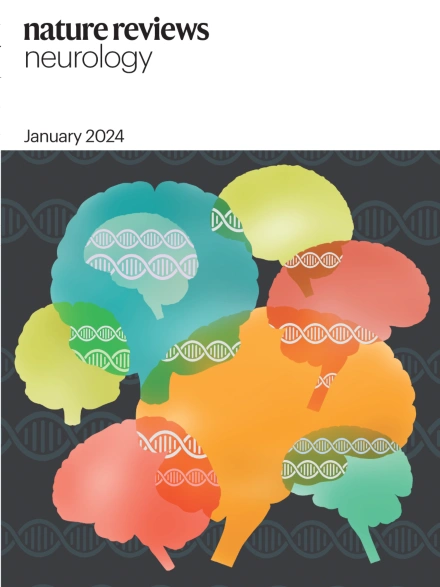Fluid biomarkers of chronic traumatic brain injury
IF 28.2
1区 医学
Q1 CLINICAL NEUROLOGY
引用次数: 0
Abstract
Traumatic brain injury (TBI) is a leading cause of long-term disability across the world. Evidence for the usefulness of imaging and fluid biomarkers to predict outcomes and screen for the need to monitor complications in the acute stage is steadily increasing. Still, many people experience symptoms such as fatigue and cognitive and motor dysfunction in the chronic phase of TBI, where objective assessments for brain injury are lacking. Consensus criteria for traumatic encephalopathy syndrome, a clinical syndrome possibly associated with the neurodegenerative disease chronic traumatic encephalopathy, which is commonly associated with sports concussion, have been defined only recently. However, these criteria do not fit all individuals living with chronic consequences of TBI. The pathophysiology of chronic TBI shares many similarities with other neurodegenerative and neuroinflammatory conditions, such as Alzheimer disease. As with Alzheimer disease, advancements in fluid biomarkers represent one of the most promising paths for unravelling the chain of pathophysiological events to enable discrimination between these conditions and, with time, provide prediction modelling and therapeutic end points. This Review summarizes fluid biomarker findings in the chronic phase of TBI (≥6 months after injury) that demonstrate the involvement of inflammation, glial biology and neurodegeneration in the long-term complications of TBI. We explore how the biomarkers associate with outcome and imaging findings and aim to establish mechanistic differences in biomarker patterns between types of chronic TBI and other neurodegenerative conditions. Finally, current limitations and areas of priority for future fluid biomarker research are highlighted. Traumatic brain injury can result in long-lasting symptoms and is associated with progressive neurodegenerative and neuroinflammatory pathology, but biomarkers to diagnose and monitor these chronic effects are lacking. Here, Thelin and co-workers summarize the available evidence for fluid biomarker use in chronic traumatic brain injury.


慢性脑外伤的体液生物标志物
创伤性脑损伤(TBI)是导致全球长期残疾的主要原因。越来越多的证据表明,成像和体液生物标志物可用于预测结果和筛查急性期并发症。尽管如此,许多人在创伤性脑损伤的慢性阶段仍会出现疲劳、认知和运动功能障碍等症状,而这一阶段缺乏对脑损伤的客观评估。创伤性脑病综合征是一种可能与神经退行性疾病慢性创伤性脑病有关的临床综合征,通常与运动性脑震荡有关。然而,这些标准并不适合所有患有慢性创伤性脑病的人。慢性创伤性脑损伤的病理生理学与阿尔茨海默病等其他神经退行性疾病和神经炎症有许多相似之处。与阿尔茨海默病一样,体液生物标志物的进步是揭示病理生理学事件链的最有希望的途径之一,从而能够区分这些病症,并随着时间的推移提供预测模型和治疗终点。本综述总结了创伤性脑损伤慢性期(伤后≥6 个月)的体液生物标志物研究结果,这些结果表明炎症、神经胶质生物学和神经变性参与了创伤性脑损伤的长期并发症。我们探讨了生物标志物与结果和成像结果之间的关联,并旨在确定慢性创伤性脑损伤与其他神经退行性疾病之间生物标志物模式的机理差异。最后,我们强调了目前的局限性和未来流体生物标志物研究的重点领域。
本文章由计算机程序翻译,如有差异,请以英文原文为准。
求助全文
约1分钟内获得全文
求助全文
来源期刊

Nature Reviews Neurology
医学-临床神经学
CiteScore
29.90
自引率
0.80%
发文量
138
审稿时长
6-12 weeks
期刊介绍:
Nature Reviews Neurology aims to be the premier source of reviews and commentaries for the scientific and clinical communities we serve. We want to provide an unparalleled service to authors, referees, and readers, and we work hard to maximize the usefulness and impact of each article. The journal publishes Research Highlights, Comments, News & Views, Reviews, Consensus Statements, and Perspectives relevant to researchers and clinicians working in the field of neurology. Our broad scope ensures that the work we publish reaches the widest possible audience. Our articles are authoritative, accessible, and enhanced with clearly understandable figures, tables, and other display items. This page gives more detail about the aims and scope of the journal.
 求助内容:
求助内容: 应助结果提醒方式:
应助结果提醒方式:


